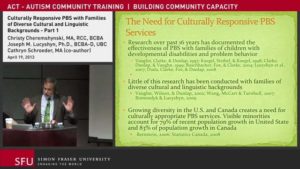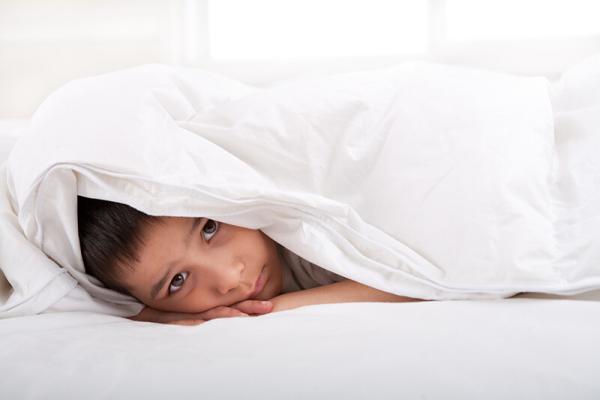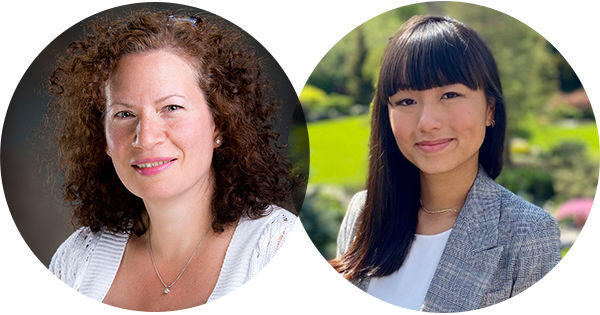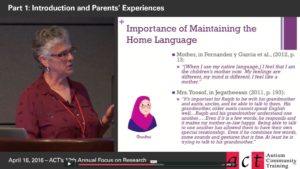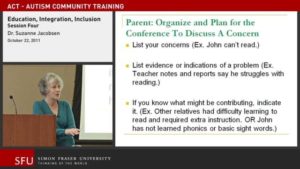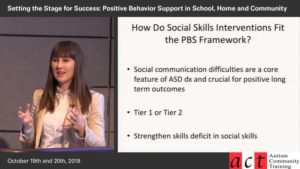Filmed June 2014 – edited into 18 parts; total 285 minutes
Many parents assume that nothing can be done about their nightly struggle to help their child with ASD go to sleep and stay asleep throughout the night. However, research is demonstrating that although common, poor sleep in children with ASD can be tackled effectively and that parent training is key to success. A good night’s sleep is fundamental to all children being able to learn and for their parents to function. This event is relevant to both professionals and parents who are looking for practical steps that parents can take to reap the benefits of improved family health and quality of life. While developed specific to autism, many of the strategies that Dr. Malow will describe are relevant to children with a range of diverse needs.
Topics include:
- Overview of Sleep Issues in Autism
- Best Practices in Sleep Screening
- Practical Sleep Screening
- Working with your Health Care Provider
- Behavioral Treatment – Strategies from Vanderbilt’s Parent Sleep Education Program
- Practical Behavioral Treatment
- designing a program for a parent volunteer based on their child’s sleep habits; constructing bedtime routine
- inviting a parent volunteer to design a program for their child.
About the Presenter
Dr. Beth Ann Malow is the Burry Chair in Cognitive Childhood Development, Professor of Neurology and Pediatrics, and Director of Vanderbilt University’s Sleep Division. Dr. Malow is the co-author of Solving Sleep Problems in Children with Autism Spectrum Disorders – a Guide for Frazzled Parents. A parent of two children with ASD, Dr. Malow has great compassion for parents and a deep understanding of the practical techniques that parents can use to improve attention and behavior and lessen anxiety through better sleep.
Part 1: Overview of Sleep Issues in ASD (25:51)
- ATN/AIR-P Sleep Tool Kits page
- Sleep Strategies for Teens with ASD: a Parents Guide
- Strategies to Improve Sleep in Children with ASD: a Parents Guide
- Sleep Tool Kit Quick Tips
- Book: Solving Sleep Problems in Children with ASD, Terry Katz, Ph.D. & Beth Ann Malow, M.D., M.S
Part 2: Standards of Sleep Screening and Screening Tools (10:33)
Part 3: Q&A (22:24)
Part 4: Sleep Screening – Insomnia and Obstructive Sleep Apnea (17:50)
Part 5: Sleep Study – Sleep-Disordered Breathing and Restless Leg (9:14)
Part 6: EEG for Nocturnal Events and Safety Measures (16:09)
Key idea: cell phone videos can be useful aid in diagnosis.
Video examples in this section have been blurred for privacy.
Part 7: Monitoring Techniques at Home and Actigraphy (7:30)
Part 8: Guidelines for Medication Treatment (12:47)
Part 9: Q&A (29:14)
Key question: What is feasible for you as a family?
Part 10: Successful Sleep: Daytime Habits, Evening Habits and Sleep Environment (15:06)
Book: Goodnight iPad
Part 11: Sleep Needs and Timing (10:16)
Part 12: Bedtime Routine Visual Schedule, Worksheet and Q&A (12:02)
Part 13: Parent Volunteer Demo: Sleep Habit Questionnaire (17:15)
Part 14: Parent Volunteer Demo: FISH (19:44)
Part 15: Parent Volunteer Demo: Bedtime Routines Worksheet and Q&A (9:31)
Part 16: Sleep Resistance, Strategies For Night Waking and Q&A (16:51)
Part 17: Bedtime Pass and Other Strategies (12:34)
- ATN/AIR-P Sleep Tool Kits page
- Sleep Strategies for Teens with ASD: a Parents Guide
- Strategies to Improve Sleep in Children with ASD: a Parents Guide
- Sleep Tool Kit Quick Tips
- Book: Solving Sleep Problems in Children with ASD, Terry Katz, Ph.D. & Beth Ann Malow, M.D., M.S
- Book: What to Do When You Dread Your Bed: a Kid’s Gide to Overcoming Problems, Dawn Huebner
Part 18: Current Research and Final Q&A (19:51)
Want more? Online interview with Dr. Malow

